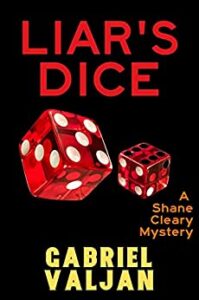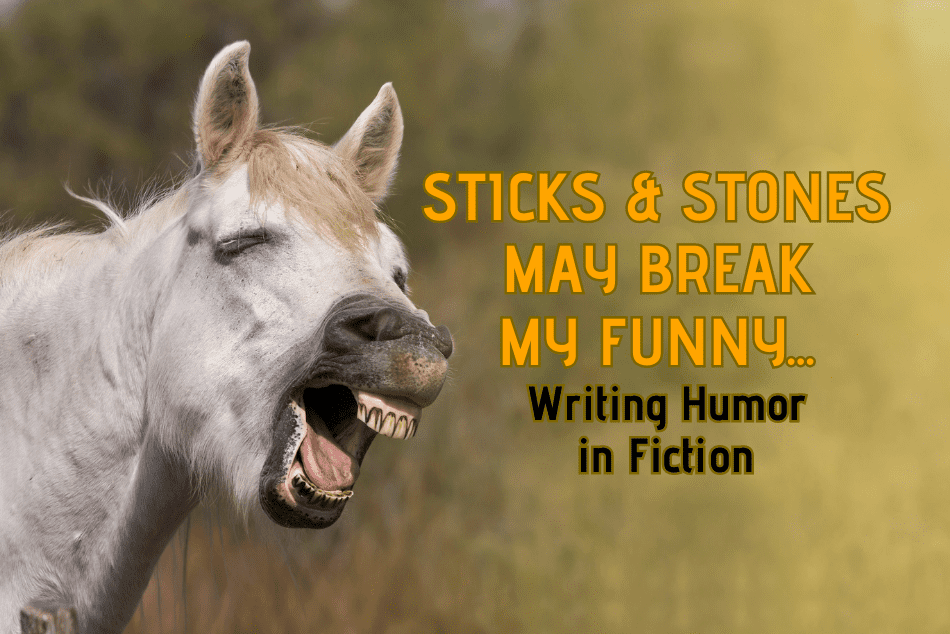In the vast ocean of How-To books on craft, I’ve never encountered one that guides writers, especially authors of crime fiction, on writing effective humor. There are beaucoup books on character development, dialogue, the Dos and Don’ts of genre, plotting, and world-building, yet none on how to tickle the reader’s funny bone.
I suppose humor is subjective. On a deeper note, I suspect Humor, like Politics, Sex, and Religion, is taboo. There’s the high risk that you’ll offend and alienate your reader. In a word, your story cruises along on the highway of 200-plus pages, then there comes the joke that groans. The gears catch and the transmission to your story drops.
Even if you write cozy mysteries, where wider latitude is given to eccentricity, writing effective humor is hard, with a capital H. Humor changes: What was funny yesterday might be insensitive today. To complicate the matter, crime (theoretically) shouldn’t be funny because it’s about transgression.
In my novel Liar’s Dice, the fourth novel in my Shane Cleary series set in 70s Boston, I use humor as a defense mechanism. Laughter helps us cope with the uncomfortable. I also tickle the funny bone to give readers a breather to process what has unfolded before them on the page. Here are two of the techniques I use to accomplish this.
#1 TALK TO THE ANIMALS
Readers familiar with the Shane series know he has a cat named Delilah. She is jealous of Shane’s girlfriend Bonnie. Delilah acts as Shane’s sounding board. He talks to her. Shane’s questions reflect his moral compass. He’ll ask her for her opinion. Other than a meow or a blink of their eyes, cats can’t talk, though they can communicate. Throughout Liar’s Dice, Delilah stares, blinks, and scurries off when tension rises.
She blinked. Her tail lifted and fell on the bedspread. I offered another excuse, transparent as cellophane, for the excursion. I said I hadn’t visited the office in weeks. There had to be a stack of mail there for me. Delilah lowered her head, curling her tail around her body to insulate herself against the lies.
Delilah is my hat tip to cozy mysteries that use animal characters to such good effect. It’s an engaging way to give readers that breather they need.

# 2 LET THE SUN SHINE IN
Like writers of cozy mysteries, I’m reserved about profanity and graphic violence. I think of my writing as hard-boiled, on the fringe of noir. Humor in those two traditions is heavy on sarcasm. Raymond Chandler’s Marlowe series is replete with one-liners. In my opinion, sarcasm isn’t clever; in the real world and said to the wrong person, you lose your teeth.
Unlike in cozy mysteries, I don’t ask for a suspension of disbelief. The Boston of the 70s I render is historically accurate. Where noir is about bad luck and characters who make the worst possible choices, Shane’s Boston is noir, nihilistic, and survival is Darwinian. Laughter is sunlight in a dark world.
Comedians say humor is all about timing, otherwise the punchline falls flat. In writerly terms, this translates into pacing and establishing the scene. For it to work, context matters. I’ll end with the passage below. I hope you laugh knowing you shouldn’t. Tony Two-Times is explaining to Shane what happened when he’d gone to pick up Bonnie at work. Tony is six-foot six, lethal as Luca Brasi, but smarter.
“He hands her a piece of paper, tells her it’s the lunch order for him and the boys upstairs. Sandwiches and salads from Pi Alley. Can you believe that? Some nerve, this guy, and he’s talking down to Bonnie like she’s his secretary or something.” Bonnie tucked her chin, suppressing a giggle, as Tony approached the punchline. “I grabbed that piece of paper, and I say to Poindexter, ‘The lady is a lawyer and a colleague of yours. Show a little class and some respect.’ He says to me, ‘Who are you?’ and I tell him, ‘Who I am isn’t important. I was talking to her, and you interrupted, and then you have the audacity to hand her a list. What’s wrong with you?’ He mumbles something, about how as a client, I should respect the firm’s lunch hour. I tell him. ‘I’m no client, and you’re not one to talk to me about respect.’ I picked the little toad up by the throat. He’s squirming against the marble wall and says to me, “What, are you going to say a four-letter word now?” I said, yeah. ‘Disrespect her again, and the four-letter word is you D-E-A-D.’”
If you smiled, then I have tickled your funny bone. A little sunlight in a dark world.
For more on how to inject humor into your fiction, join us on Facebook.
 Gabriel Valjan is the author of the Shane Cleary Mysteries from Level Best Books. He has been nominated for the Agatha, Anthony, Silver Falchion Awards, and received the 2021 Macavity Award for Best Short Story. Gabriel is a member of International Thriller Writers, Mystery Writers of America, and Sisters in Crime. He lives in Boston and answers to a tuxedo cat named Munchkin.
Gabriel Valjan is the author of the Shane Cleary Mysteries from Level Best Books. He has been nominated for the Agatha, Anthony, Silver Falchion Awards, and received the 2021 Macavity Award for Best Short Story. Gabriel is a member of International Thriller Writers, Mystery Writers of America, and Sisters in Crime. He lives in Boston and answers to a tuxedo cat named Munchkin.





